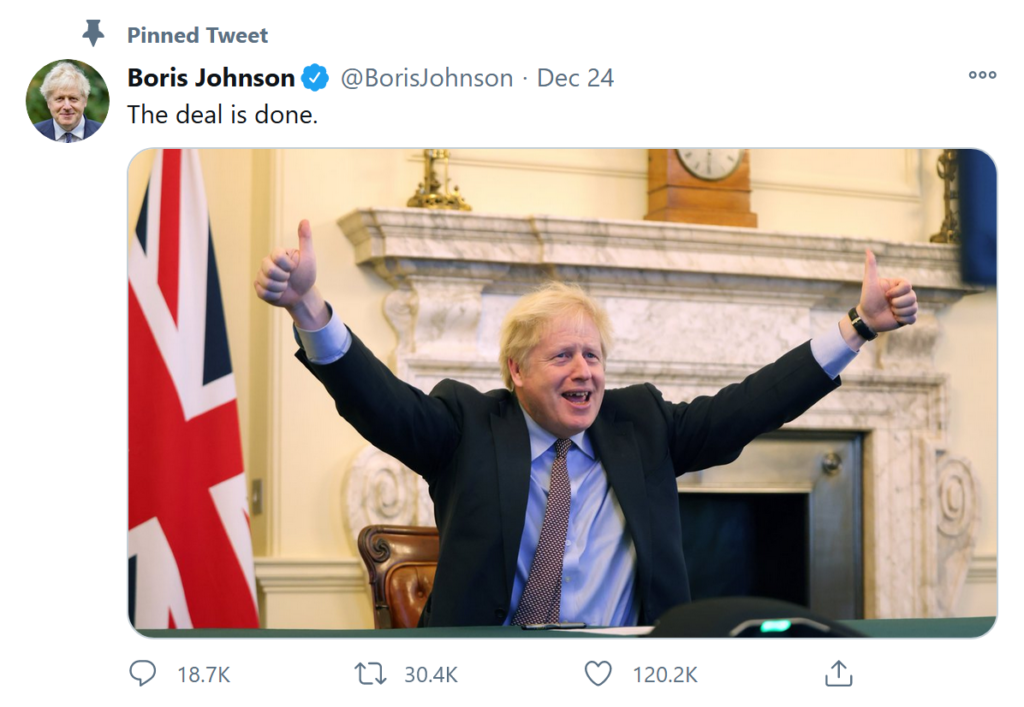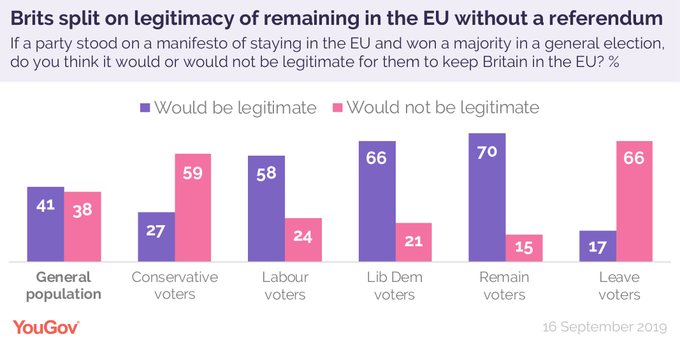At least one thing is clear now: this is their Brexit. This is what they fought like dogs for; divided the country for; sank the £ for; prorogued Parliament for; alienated Scotland for; cast off N. Ireland for; blew £200bn for; and trashed our international reputation for. This.
Tag Archives: Brexit
Comfort and Joy
Johnson and co want us to celebrate the trade deal and move on. But for the supporters of both Remain and Leave, it isn’t that simple, and the architects of Vote Leave have only themselves to blame.
Glad tidings! Boris Johnson has a present for the country. His draft EU/UK trade deal is a “feast” to follow the “starter” that was the oven-ready meal of the Withdrawal Agreement. Not just that. More than a mere gift, the deal finally resolves “a question that has bedevilled our politics for decades”. Like its illustrious architect, this deal deserves a place in history.
Set aside the astonishing denial of facts. Hard Brexit is far worse than the arrangement we had before, and far worse than anything suggested during the referendum campaign. It is “project fear” writ large and long. It entails an amount of red tape more suited to a bygone age, and a very significant, permanent diminution in the size of our economy. It is, as a matter of economic fact, anything but a gift. It takes rather than gives. It is the very opposite of Christmas.
Johnson once joked that voting Conservative would “cause your wife to grow larger breasts”. But we now know that, unless you’re one of their cronies, voting Tory has caused your wallet to shrink while everything else has, sadly, sagged.
Set aside, too, the astonishing hubris. The “World King” now adding “Glorious Solver of Political Schisms” to his self-styled grandiosity. Not to mention “Father Christmas”.
All that trolling and narcissism aside, what Johnson and co now appear to want is a pass to avoid scrutiny. To move on from what has, on anybody’s measure, been a disaster for our politics, our economy, and our society. Michael Gove, writing in today’s The Times, hopes the Brexit deal will end the “ugly politics”:
“Friendships have been strained, families were divided and our politics has been rancorous and, at times, ugly. Through the past four years, as a politician at the centre of this debate, I’ve made more than my share of mistakes or misjudgements, seen old friendships crumble and those closest to me have to endure pressures they never anticipated.”
Note the modest mea culpa in there too. The Brexiter politicians have got what they wanted. Now they want, with much fanfare and some token apology, to wipe away the damage, sidestep the scrutiny, and invite us, in the spirit of Christmas, to unite behind them. They want Brexit to be bookended, as if it began with Dimbleby’s referendum night “We’re out!”, and ended this week with Johnson’s triumphant, arms-outstretched “The deal is done”.

The weight of the evident desire to close a chapter is revealing. It suggests – doesn’t it? – that, for the Vote Leave politicians and their shady backers, the job is done. It suggests that getting here, in and of itself (and separately from any economic or social consequences for the country) has a payoff for them. It is the result. Now and not next year. You can speculate as to what that precise payoff is for them, but remember that Johnson’s own sister wondered if it was to do with protecting the UK’s network of tax havens from EU regulation. That job is surely done.
Whatever the true motive for such a dogged and harmful pursuit of Hard Brexit, it is clear that the Vote Leave politicians wish to bank this achievement, close the book on it, and roll on to the next item on their agenda for our unsuspecting country. History warns us that disrupters with this amount of power and this lack of regard for institutions, protocols and democracy, will have some nasty surprises up their sleeves. It also tells us they will only be stopped by force. It doesn’t bear thinking about.
But for voters it won’t be so easy. Because there is a fundamental tension between the politicians’ evident desire for Brexit to be over, and the way Vote Leave (the very same politicians) burmed Brexit into its supporters’ psyches. It did so, very substantially, by selling it as a working class fight with the middle class, whom it skilfully misidentified and branded as “the elite”. A section of society, typically without higher education, enjoyed a new-found power, through the leveller of the ballot box, to stick it to the comfortable, typically university-educated, middle classes. These Brexit supporters, it was at least plausibly argued, were Britain’s Left Behind, and felt it. They were, undoubtedly, harder hit by Tory austerity. They were inclined to believe suggestions that life, for them, would be better outside of the EU. And even if it weren’t, it was still likely that the middle classes would get a taste of suffering. It was the ugly inverse of “levelling up”. Nothing made them happier than mocking Waitrose shoppers fretting about the risk of losing their epoisses cheese post-Brexit, or People’s Vote marchers breaking away from genteel protesting to grab a prawn sandwich from Pret.
This class warfare, or higher- versus school-educated warfare, or culture war as it is variously described, has become entrenched. As many Remainers have noted, 2016’s winners were not suddenly happy. They had won, but they still wanted to fight. They wanted to rub Remainers’ noses in their victory. They may have said, repeatedly, “You lost, get over it,” but it appeared that the very last thing they wanted was for anybody to get over it. They wanted it to hurt. They wanted Remainer tears. They pushed and prodded until they got them. Then they started all over again. Much of this was, and still is, sustained by a number of high-profile provocateurs, with links to Vote Leave, whose social media accounts thrive on a shock-and-awe, professional nastiness which has come to define the tone of political discourse in our times.
The referendum victory did not deliver for the people who voted for it. It did not resolve any issues that had “bedevilled” them for decades, not least because many of them had little idea of, or care for, the EU’s role until they were whipped into a Cambridge Analytica-induced frenzy in 2016. The win changed nothing, except to embolden their baiting, at least in their eyes giving an intellectual endorsement to the Brexit position: it must have been right, because it received more votes. It must have been right, because the Government was now enacting it. And yet there was no pleasure in the content of the win. No pleasure in the consequences of Brexit. No identification of benefits for the country beyond a nebulous notion of “sovereignty” – sovereignty which, on any proper analysis, has been not so much restored as sacrificed.
The pleasure in Brexit for so many of its supporters on the ground was not, and is not, answered by the reality of Brexit. It is answered in seeing the pain of those who feel its consequences most acutely. It is answered in the ongoing stimulation of that pain. If the Brexit story were ever to be closed, that ongoing pleasure would be taken away. If the Remainers ever really accepted loss and “got over it” – if they ever truly “moved on” – the Brexiter public, as distinct from its instigators, would lose their sensation of power. They can no more accept Brexit for what it is and move on than the Remainers can.
For the Remainers, moving on from a Hard Brexit – mocked as absurd alarmism in the early days, but now wrapped in a Christmas bow – is not going to happen any time soon. Even if this had been a soft Brexit, retaining full membership of the Single Market and Customs Union, a trade deal is only a trade deal. Just as the Brexit-voting public don’t appear to be as bothered by commercial harm as symbolic freedom – the much-vaunted emotion of Brexit – so it is with Remainers. The trade deal could be fantastic, but the emotion of membership would always be missing. Remainers and Leavers alike have associated freedom with their cause. And belonging. Identity. You don’t “move on” from that kind of stuff in a hurry, and certainly not just on the basis of a trading arrangement. The key drivers of the Brexit debate – emotion and identity – are wholly untouched by a trade deal.
Perhaps the Vote Leave cabal realises this. Perhaps a mighty dread has seized their troubled minds. If not, and they really think they can gaily and without consequence skip to the next chapter, it would only go to show how little they understood the division they’ve been stoking these last few years, and the reckless cynicism with which they have stoked it. Either way, God rest ye merry, gentlemen. God rest ye.
Thanks for reading. Please help me reach more like-minded readers by using the sharing buttons below. Thank you!
What Would A Second Referendum Prove Anyway?
“Say there was a 2nd vote, and it went marginally for Remain – what would that prove? It wouldn’t settle anything. Imagine it’s 52/48 for Remain. That’s the same as Leave got first time round. What would you do then? Have another vote? Best of three? Four? Five? It would be ridiculous. We’ve had a vote, the people have spoken, let’s get on with it.”
The LibDems and Legitimacy
In the light of the LibDem policy on revoking article 50 (the abreaction to which I discuss here) YouGov asked people the following question:

“If a party stood on a manifesto of X policy and won a majority in a general election, do you think it would or would not be legitimate for them to enact X policy?”
Out of context, most people would say it would always be legitimate, every single time.
